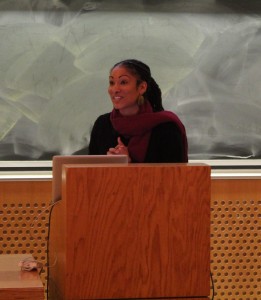Social Hackers Empower Women
-
-
slice.mit.edu
- 1
Filed Under
Recommended
In one, a young dancer improvises during a cookie-cutter recital and steals the show. In the other, Louisiana State University gymnast Lloimincia Hall performs a 10.0 floor exercise that looks more like an ad-lib tumbling act than a traditional routine. These performances are examples of what Ruha Benjamin, assistant professor, sociology and African American studies at Boston University, calls social hacking.
In her talk, Playing the Game or Hacking the System, Benjamin lauded these social hackers, encouraging the women in the audience to tap into their childhood defiance to break through norms and advance in their desired careers. Benjamin was quick to note that they would not always be praised for hacking the system. “Off stage in institutions, challenging systems is typically threatening, not entertaining,” she said.

Benjamin’s talk supported the empowerment theme by focusing on the pros and cons of both stepping out and fitting in as women navigate their careers and lives. The title of Benjamin’s talk provided two viable options for women.
Benjamin highlighted benefits of playing the game through code switching, defined as how a person’s behavior may change based on the people around them. Code switching can be essential to everyday life, but women often code switch to be subservient—Benjamin cited women’s changed body language and decreased assertiveness around men as one switch. This kind of code switch allows women to navigate conversations and careers within male dominated institutions, but may also impede women, preventing them from breaking rules and growing professionally as a result.
Benjamin closed her talk by encouraging the graduate women to be aware of the sociological aspects of their future careers. She explained that in even the most technical sciences, “what and who we chose to study” can make profound difference in the norms and pathways created for the next generation of women.








Comments
Peter Crick
Mon, 05/12/2014 9:04pm
Well said !